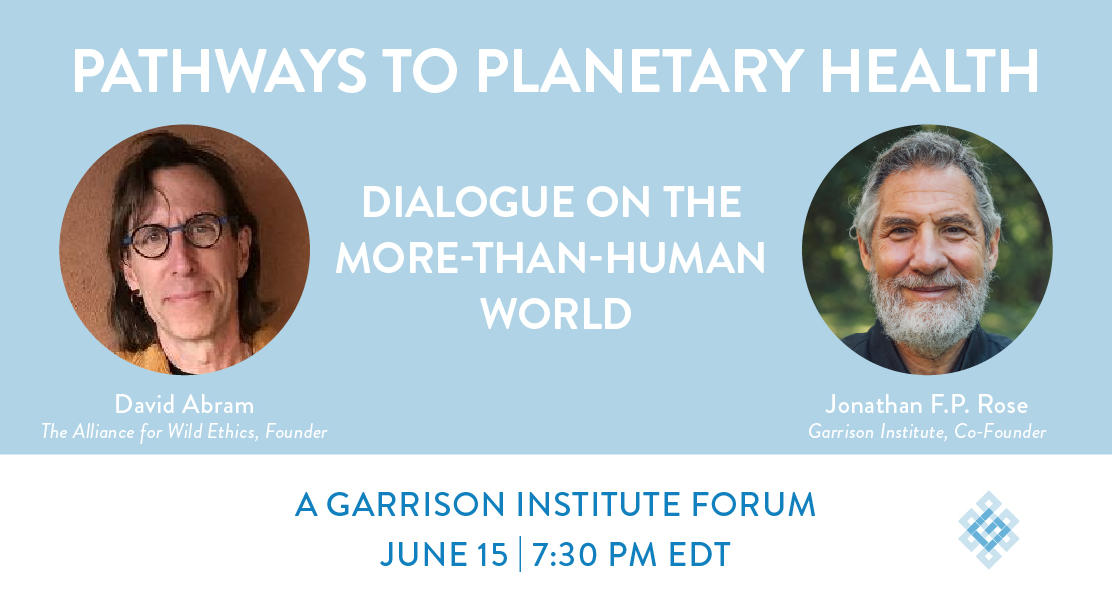Pathways to Planetary Health Forum: David Abram on the More-than-Human World
On June 15, we continued the Garrison Institute Forum on Pathways to Planetary Health (PPH) with a conversation between cultural ecologist, philosopher and founder of The Alliance for Wild Ethics David Abram and Garrison Institute co-founder Jonathan F. P. Rose. In this dialogue, they explored a worldview that transcends the anthropocentric and accepts earthly nature as “more-than-human,” to use Abram’s phrase adopted by the ecological movement. A student of indigenous ecological knowledge systems, Abram is a contemporary philosopher who reappraises our human-centered view of life and emphasizes our participation in the holism of nature. We invite you to learn more about Abram’s work and revisit this compelling conversation below.
This interactive online event was part of a continuing series in the Garrison Institute’s Forum on Pathways to Planetary Health (PPH). Building on the Garrison Institute’s earlier Climate, Mind and Behavior (CMB) program, Pathways to Planetary Health explores the moral, ethical, and human behavioral dimensions of the search for regenerative solutions, including Half-Earth, Ecological Civilization, Regenerative Economics, and Societal Altruism.
David Abram – cultural ecologist and geo-philosopher – is the author of Becoming Animal: An Earthly Cosmology, and The Spell of the Sensuous: Perception and Language in a More-than-Human World. Described as “revolutionary” by the Los Angeles Times, as “daring” and “truly original” by the journal Science, David’s work has helped catalyze the emergence of several new disciplines, including the burgeoning field of eco-psychology. Dr. Abram’s work engages the ecological depths of the imagination, exploring the ways in which sensory perception, language, and wonder inform the relation between the human body and the breathing earth. In 1996, David coined the phrase “the more-than-human world” to speak of nature as a realm that thoroughly includes humankind and all our cultural productions, but always necessarily exceeds humankind; the phrase has now been taken up as part of the lingua franca of the broad movement for ecological sanity. David’s philosophical craft is informed by his fieldwork with indigenous peoples in southeast Asia and the Americas, as well as by the philosophical tradition of phenomenology. He was the first contemporary philosopher to advocate for a reappraisal of “animism” as a complexly nuanced and uniquely viable worldview, one which roots human cognition in the dynamic sentience of the body while affirming the ongoing entanglement of our bodily experience with the uncanny intelligence of other animals, each of whom encounters the same world that we perceive yet from an outrageously different angle and perspective.
A close student of traditional ecological knowledge systems (TEK) of diverse indigenous peoples, David’s work also articulates the entwinement of human subjectivity with the varied sensitivities of the plants upon whom we depend, as well as with the agency and dynamism of the particular places, or bioregions, that surround and sustain our communities. In recent years Dr. Abram’s work has come to be associated with a broad movement loosely termed “New Materialism,” due to his espousal of a radically transformed sense of matter and materiality. A Fellow of Schumacher College in England, David is founder and creative director of the Alliance for Wild Ethics (AWE). For more information on David’s work, please visit: The Alliance for Wild Ethics.

